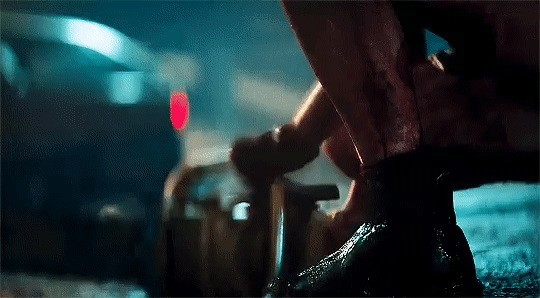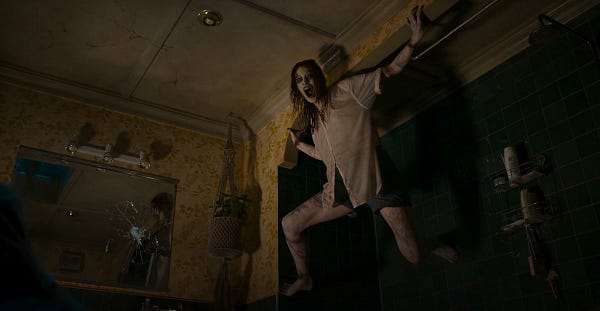I’ve been noticing that an awful lot of movies and TV shows these days “debut with 100% on Rotten Tomatoes,” worded like that. Everyone is aware that it’s the studios that provide critics with screeners, right? When something debuts with a perfect rating, that means the score comes from critics who received the content before anyone else did. Kinda suspect, no? These scores usually drop once the content is seen by more than just the first batch of critics, but the media sites make sure to report on it while the score is still perfect.
A new Warner Bros. film titled Evil Dead Rise, the fifth entry in the Evil Dead franchise, had its premiere screening at SXSW on Thursday. Early that day I noticed on Twitter a viral video that showed a heckler at the Q&A after the film’s screening shouting, “This movie fucking sucks,” to which the film’s producer and face of the franchise (even though he’s not in this film), Bruce Campbell, responded, “Get the fuck out of here!”
Fans were rejoicing in the replies. People loved that Campbell has still got it. Could this have been staged in order to give Campbell a moment to be Ash again? Who would shout “the movie fucking sucks” in a large crowd of fans, especially considering the film is - surprise - debuting with 100% on Rotten Tomatoes?
These were not my first thoughts. I initially scrolled past the video, not really caring, but then when I saw the tweets from people who were in attendance at the screening I started to think that nothing about this event seems genuine.
The Atom Review (with under 500 followers on Twitter) posted:


The film’s director Lee Cronin quote tweeted The Atom Reviews’s tweet with a joke about how the review says the movie “beats you off,” boosting the tweet to Cronin’s 12K followers. As of right now, the tweet by The Atom Reviews has accumulated 2,743 quote tweets. People are really talking about this! I’m talking about it! The buzz works! Everyone is not only seeing that someone made a weird comment about beating off but also that the film is “one of the best films ever.” How often does a person go see the fifth installment in a horror franchise at a film festival and walk away saying it’s one of the greatest films of all time?
Jacob Hall, the senior news editor of a media site called /Film, posted the following:

It’s worth noting that /Film is owned by Peter Sciretta, an alum of Ain’t It Cool News, which lost its credibility in the early 2000s once it became seen as compromised by the studios. Basically everyone knew the site’s owner, Harry Knowles, was in the studios’ pockets after he did stuff like appear in The Faculty for the Weinsteins and give 1998’s Godzilla a fawning review. Knowles had been instrumental in the 90s in shepherding online movie geeks to Quentin Tarantino.
Eric Vespe, also an Ain’t It Cool News alum, tweeted:


Everyone who was there says the same thing - this is one movie you don’t want to miss! How are all of these people always in lockstep with every one of their takes?











I mean I guess it makes sense in the case of Evil Dead Rise. You heard what Bruce Campbell said. If you think this movie sucks you can get the fuck out of here!***
In 2017, after Armond White was the sole dissenting voice on Get Out’s Rotten Tomatoes, lowering the film’s score from 100% to 99%, Jordan Peele was asked why there was only one critic who didn’t like the film, and his answer was, “Racism.” Armond White is a black conservative, and he has rather unusual taste on top of that, so his opinion is often dismissed as the rantings of a contrarian. Although I quite like Get Out, it didn’t make logical sense to me that this horror film could be so universally beloved (I don’t care how talented Peele is; this was just extremely contrived). This was a watershed moment for me because I knew the media was being manipulated in ways we had never quite seen before.
It was one thing for the Weinstein brothers to put millions of dollars behind Quentin Tarantino’s PR in the 90s. For those of us who remember 1994, Pulp Fiction was hands down the most talked about film of the year, winning the Palme d’Or and being nominated for Oscars in just about every major category. Tarantino was elevated to a certain status of respect that I had never seen any other director accomplish in such a short amount of time. It was like, before 1994 there was Martin Scorsese. After 1994, there was Scorsese and Tarantino.
Peter Biskind detailed in his 2004 book Down and Dirty Pictures the ruthless tactics the Weinstein brothers utilized to take over film in the 90s, leaning on PR and awards to ingratiate their roster of directors to society. Tarantino was their Secretariat. He outperformed Robert Rodriguez, Kevin Smith, Steven Soderbergh, and all of the other directors that the Weinsteins put a lot of money behind.
Tarantino is a uniquely talented director, so the PR money was able to go a long way. This has also been the case with Peele, but nowadays the press is not as free as it once was. Back in 1994, Pulp Fiction received mostly positive reviews but it had its share of detractors. Variety, The New York Times, and The Los Angeles Times, arguably the three most influential publications to the world of film, panned Pulp Fiction. Kenneth Turan described it as “hardly worth the fuss.” Janet Maslin wrote that it was “monotonous and empty.” Todd McCarthy called it “self-indulgent.”
After all was said and done, Get Out was only panned by three major critics - Armond White, Kyle Smith, and Rex Reed, and if you’ve been following film for as long as I have you’ll know those three guys have a reputation for going against the grain. Two of those reviews came from The National Review, which doesn’t have the same kind of influence that, say, The New York Times does. It shouldn’t even have been an issue that these three guys dissented with their opinions, but it was such a huge deal that Peele himself publicly shamed one of them.***
Let’s get into who is constantly reporting on these perfect Rotten Tomatoes debuts.
In the trailer for Luca Guadagnino’s Bones and All, the quotes they used were from The Hollywood Reporter, Time, and Discussing Film. Everyone knows The Hollywood Reporter and Time but unless you’re on Twitter a lot you probably have never heard of Discussing Film.
In a GQ article from last year titled “How Normie Twitter Accounts Became the Go-To Source for Breaking News” Gabriella Paiella writes about the phenomenon of the sudden rise of faceless media accounts dedicated to round-the-clock PR:
“Discussing Film… is run by Jacob Fisher, a 21-year-old digital marketing student based in Northern England. He founded Discussing Film in 2016, but started using it in earnest sometime around 2018. There’s also an accompanying site that posts reviews and interviews and employs a team of 15 paid staffers mostly based in the States. Most people are only aware of the Twitter, which posts 40 to 50 times per day, but the site is primarily how Discussing Film makes money, save for the occasional streaming service affiliate link.”
What about the Twitter account Film Updates? They are nearly as popular as Discussing Film. Who are they? According to Paiella, the account is run by an anonymous trio of “students in their 20s who reside in the US, the UK, and Pakistan.”
Another popular Twitter account, Culture Crave, is, according to Paiella, “Zach Williamson, a 28 year-old based in San Francisco.”
None of them were willing to share with Paiella how much money they were earning annually.
Comicbook.com is owned by Valnet Inc., a Canadian digital media company that also owns the ubiquitous Screen Rant, CBR, The Sportster, Game Rant, and several others. These sites accept reader submissions and they each post dozens of articles per day, most of them so generic that they could be written by an AI.
Cinemablend is a similar site owned by Gateway Blend, which owns and operates 14 websites. Its CEO Kasey Grelle said in an interview in 2020:
“In the media space, it's definitely a buyer’s market. There are a lot of businesses out there that have not been as diligent about putting together a sound business plan or really focusing on building a good culture, a good company, and making money. A lot of people went after venture money a couple of years ago and then built big teams with really expensive operations, but they didn't focus as much on making money. We've always been focused on making money from the beginning and so, as a result, some of those companies, when the VC money dried up in the media space, are having trouble. It’s actually a buyer’s market for us right now, and you're seeing a lot of companies going out there and doing roll-ups.”
The term “roll-up” is used to describe a strategy where multiple smaller companies in the same industry are acquired and merged into a larger entity.
All the sites you see are owned by the same people.
Movieweb.com is owned by the venture-backed Watchr Media out of Los Angeles.
If you want to read about any given new release, chances are you’re going to see a lot of those sites in the search results. Did I miss any? Do a little digging and you’ll find that most of these ubiquitous media sites are ultimately just PR firms for larger media companies.***
It’s a lot easier to control a faceless digital media company started in 2018 than it is to control the movie critic for the Chicago Sun Times.
It’s a lot easier to point to a review aggregator that assigns a numerical score to each film than it is to win over smart critics from established newspapers.
Tl; dr: All of this shit is fake! Literally all of it. You are being fed PR by paid shills until it comes out of your eyeballs. The announcements, the hot takes, the Rotten Tomatoes scores, they’ve all been carefully curated by marketing execs to push whatever narrative they want you to believe. This comes right down to the amount of likes on one of these weirdo’s tweets. They have got this locked down air tight. When you hear something debuted with a perfect score on Rotten Tomatoes, I think it’s safe to say don’t believe the hype.
Public Enemy warned you thirty-five years ago. Why do you think the media destroyed their reputation?




